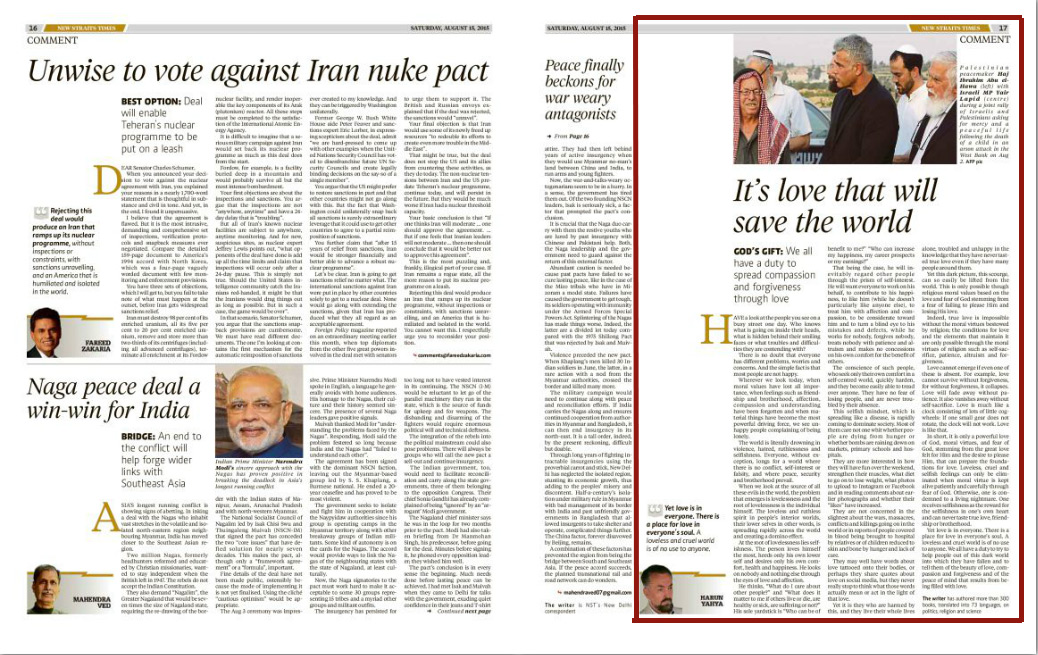
HAVE a look at the people you see on a busy street one day. Who knows what is going on inside their heads, what is hidden behind their smiling faces or what troubles and difficulties they are contending with?
There is no doubt that everyone has different problems, worries and concerns. And the simple fact is that most people are not happy.
Wherever we look today, when moral values have lost all importance, when feelings such as friendship and brotherhood, affection, compassion and understanding have been forgotten and when material things have become the most powerful driving force, we see unhappy people complaining of being lonely.
The world is literally drowning in violence, hatred, ruthlessness and selfishness. Everyone, without exception, longs for a world where there is no conflict, self-interest or falsity, and where peace, security and brotherhood prevail.
When we look at the source of all these evils in the world, the problem that emerges is lovelessness and the root of lovelessness is the individual himself. The loveless and ruthless spirit in people’s interior worlds, their lower selves in other words, is spreading rapidly across the world and creating a domino effect.
At the root of lovelessness lies selfishness. The person loves himself the most, heeds only his own lower self and desires only his own comfort, health and happiness. He looks on nobody and nothing else through the eyes of love and affection.
He thinks, “What do I care about other people?” and “What does it matter to me if others live or die, are healthy or sick, are suffering or not?” His sole yardstick is “Who can be of benefit to me?” “Who can increase my happiness, my career prospects or my earnings?”
That being the case, he will inevitably regard other people through the prism of self-interest. He will want everyone to work on his behalf, to contribute to his happiness, to like him (while he doesn’t particularly like anyone else), to treat him with affection and compassion, to be considerate toward him and to turn a blind eye to his mistakes and defects, while he works for nobody, forgives nobody, treats nobody with patience and altruism and makes no concessions on his own comfort for the benefit of others.
The conscience of such people, who seek only their own comfort in a self-centred world, quickly harden, and they become easily able to tread over anyone. They have no fear of losing people, and are never troubled by their absence.
This selfish mindset, which is spreading like a disease, is rapidly coming to dominate society. Most of them care not one whit whether people are dying from hunger or whether bombs are raining down on markets, primary schools and hospitals.
They are more interested in how they will have fun over the weekend, strengthen their muscles, what diet to go on to lose weight, what photos to upload to Instagram or Facebook and in reading comments about earlier photographs and whether their “likes” have increased.
They are not concerned in the slightest about the wars, massacres, conflicts and killings going on in the world or in reports of people covered in blood being brought to hospital by relatives or of children reduced to skin and bone by hunger and lack of care.
They may well have words about love tattooed onto their bodies, or perhaps they share quotes about love on social media, but they never really stop to think what those words actually mean or act in the light of that love.
Yet it is they who are harmed by this, and they live their whole lives alone, troubled and unhappy in the knowledge that they have never tasted true love even if they have many people around them.
Yet this dark picture, this scourge, can so easily be lifted from the world. This is only possible though religious moral values based on the love and fear of God stemming from a fear of failing to please Him and losing His love.
Indeed, true love is impossible without the moral virtues bestowed by religion; the conditions for love and the elements that maintain it are only possible through the moral virtues of religion such as self-sacrifice, patience, altruism and forgiveness.
Love cannot emerge if even one of these is absent. For example, love cannot survive without forgiveness, for without forgiveness, it collapses. Love will fade away without patience. It also vanishes away without self-sacrifice. Love is much like a clock consisting of lots of little cogwheels: If one small gear does not rotate, the clock will not work. Love is like that.
In short, it is only a powerful love of God, moral virtues, and fear of God, stemming from the great love felt for Him and the desire to please Him, that can prepare the foundations for love. Loveless, cruel and selfish feelings can only be eliminated when moral virtue is kept alive patiently and carefully through fear of God. Otherwise, one is condemned to a living nightmare. One receives selfishness as the reward for the selfishness in one’s own heart and can never taste true love, friendship or brotherhood.
Yet love is in everyone. There is a place for love in everyone’s soul. A loveless and cruel world is of no use to anyone. We all have a duty to try to help people out of this dark world into which they have fallen and to tell them of the beauty of love, compassion and forgiveness and of the peace of mind that results from being filled with love.
Adnan Oktar's piece on New Straits Times:


